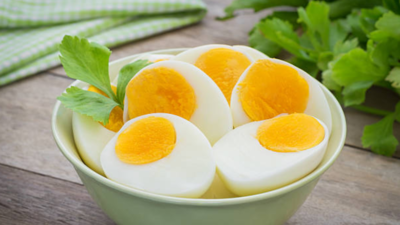- News
- lifestyle
- health-fitness
- health-news
- Are two eggs enough for an adult’s daily protein intake?
Trending
Are two eggs enough for an adult’s daily protein intake?
Two eggs for breakfast provide a solid protein foundation but may not fulfill daily protein needs for most adults, particularly those with higher activity levels. Eggs are nutritious but should be paired with other protein-rich foods like Greek yogurt, legumes, and nuts to ensure optimal nutrition. Individuals with health concerns should consult medical advice on egg consumption.
Protein is an essential macronutrient required for muscle repair, immune function, enzyme production, and overall bodily health. Many people rely on eggs as a primary source of protein due to their affordability, convenience, and rich nutrient profile. It is a common practice to have 2 eggs in the morning and many believe that it is sufficient to meet the protein requirement of an adult.
However, a common question arises: are two eggs sufficient to meet an adult’s daily protein requirements? The answer depends on various factors. Let's understand.
Eggs have an incredible nutrient profile

The intake of eggs as the basic source for protein may result in nutrient gaps since they lack fiber, along with adequate iron and other essential micronutrients that are part of various food sources. For instance, one large egg contains around 6–7 grams of protein, so two eggs serve around 12–14 grams. This is not a lot but sufficient for most adults as part of the daily protein requirement. An average sedentary adult should have about 0.8 grams of protein per kilogram of body weight. For instance, for a 70 kg person, that would mean about 56 grams of protein daily—which is significantly more than what two eggs provide.
Know how much protein do you need
One key benefit of protein is its role in satiety, which helps control hunger and prevent overeating. Protein-rich meals keep you full for longer by slowing digestion and stabilizing blood sugar levels. While two eggs contribute to satiety, a higher-protein meal can be even more effective in curbing appetite throughout the day. Those aiming for weight loss or muscle gain may need to increase their protein intake beyond what two eggs provide to maximize metabolism and muscle retention.
Are two eggs enough for breakfast?
However, certain individuals are not allowed to eat more than two eggs in a day! A common concern regarding egg consumption is cholesterol content. While eggs do contain dietary cholesterol, research has shown that they have minimal impact on blood cholesterol levels for most people. In fact, eggs can be part of a heart-healthy diet when consumed in moderation. Those with specific health conditions, such as diabetes or heart disease, should consult a doctor to determine appropriate egg consumption. Generally, eating two to three eggs daily is considered safe for most healthy individuals, as long as the rest of the diet is balanced and varied.
Pair the eggs smartly
- Lean meats– 25–30 grams of protein per serving
- Fish – 20–25 grams per serving
- Dairy products (Greek yogurt, cottage cheese, milk) – 10–20 grams per serving
- Legumes and beans (lentils, chickpeas, black beans) – 15–20 grams per cup
- Nuts and seeds (almonds, peanuts, chia seeds) – 5–10 grams per serving
By incorporating these foods into meals alongside eggs, individuals can easily meet their protein needs without consuming excessive quantities of any single food.
Special considerations for vegetarians and vegans
End of Article
FOLLOW US ON SOCIAL MEDIA
Visual Stories
Tired of too many ads?go ad free now











